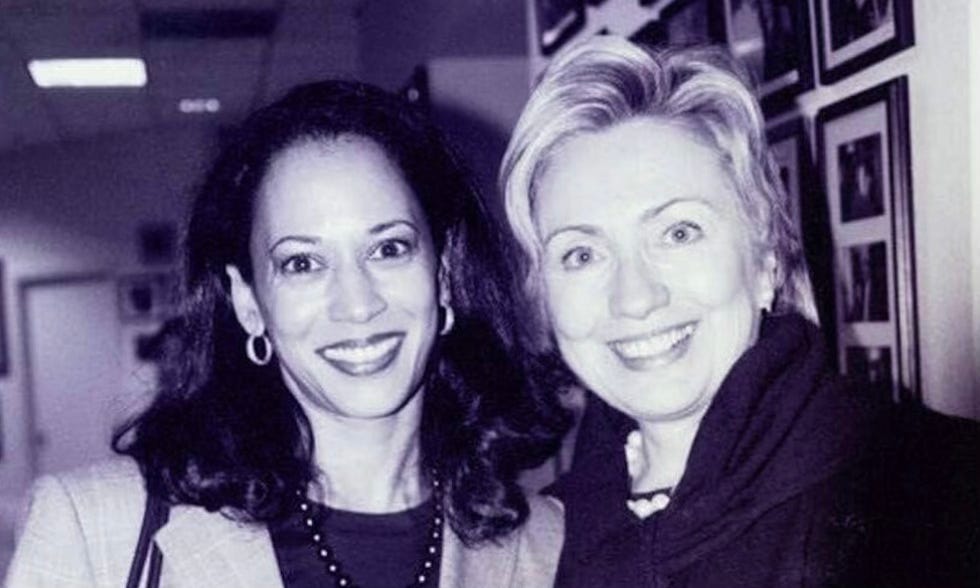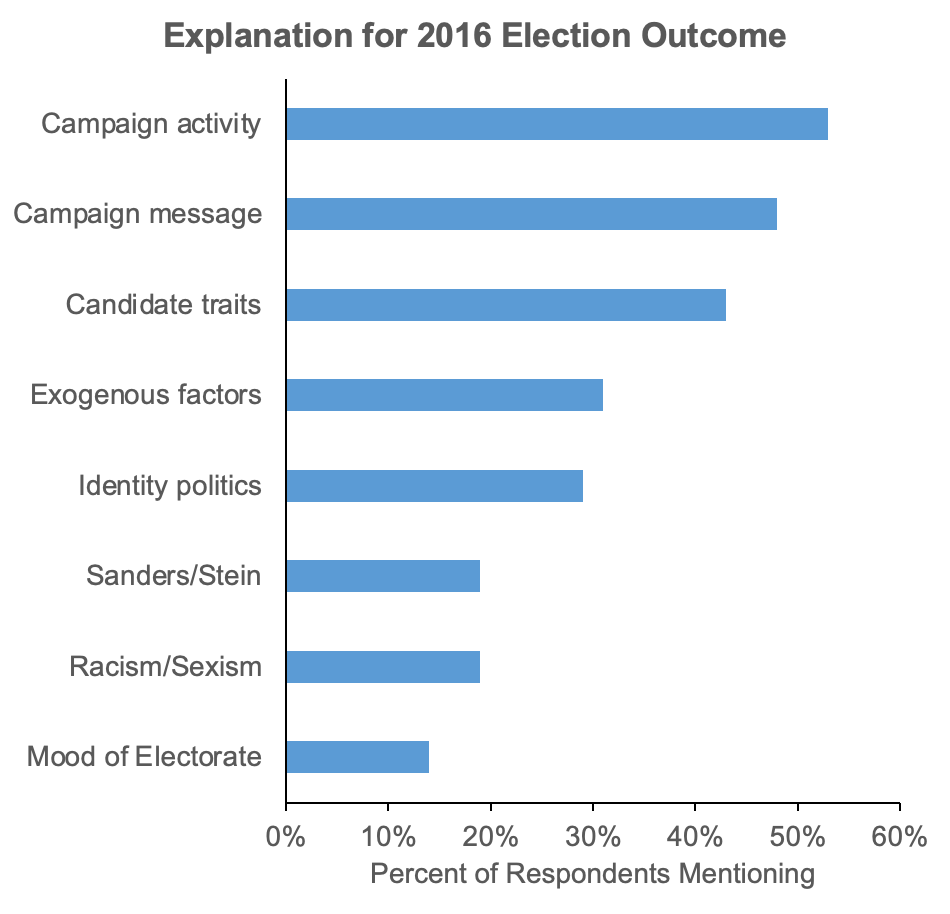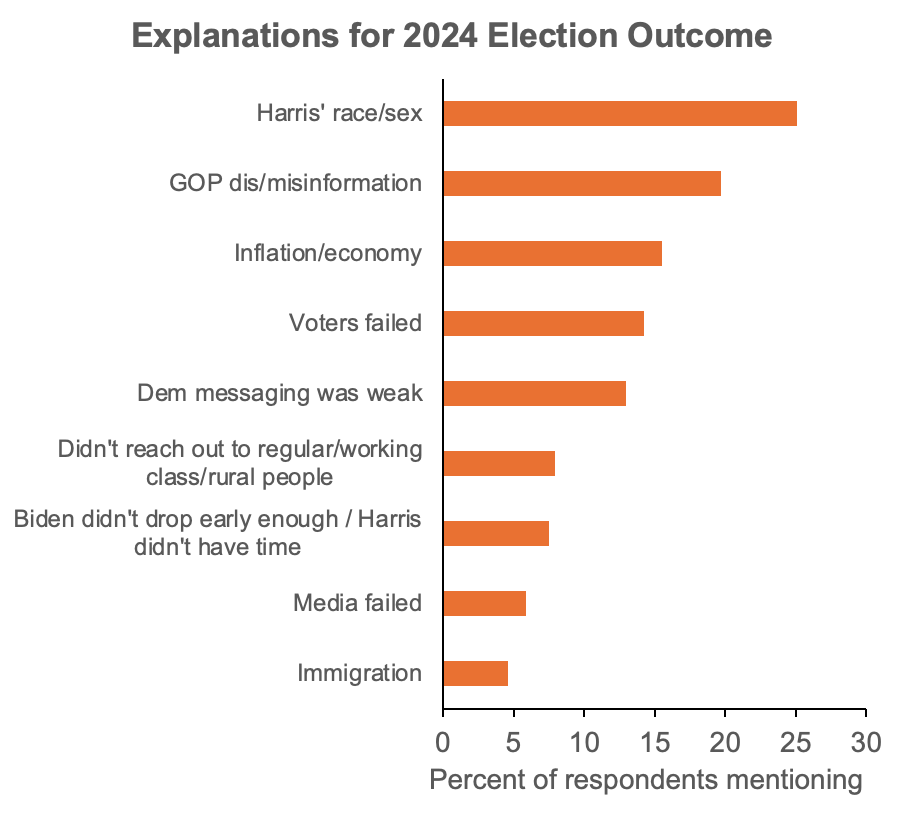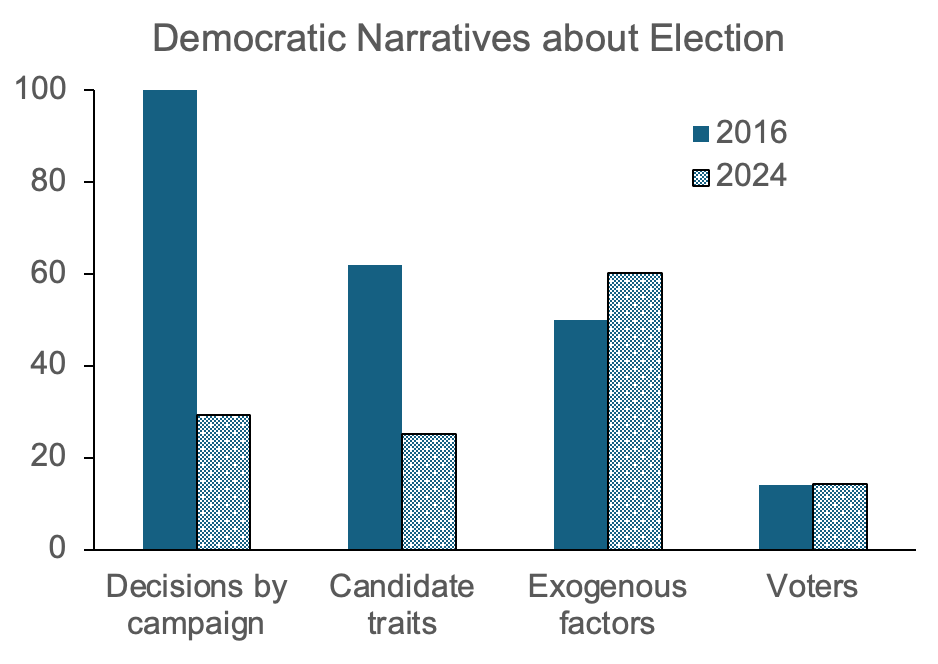Who Democrats blamed in 2016 and 2024
Democrats were less likely to fault the candidate this year than they were eight years ago
In my previous post, I showed the results of an open-ended survey of Democratic county chairs conducted during the two weeks following the 2024 election, asking those chairs why they thought Kamala Harris lost to Donald Trump. In this piece, I am comparing the results of this survey with the interviews I did with Democratic activists about the 2016 presidential race.
Now, these were very different data collection approaches. In the wake of 2016, I interviewed 65 Democratic activists in the early primary and caucus states, and I used those interviews for my 2020 book Learning From Loss. For the more recent study, I did a survey of hundreds of county party chairs. These are obviously not the same people, although there’s at least some overlap. Also, the 2016 interviews were lengthy conversations, rather than a short on-line survey, and I coded those for their mention of different explanations of Hillary Clinton’s loss to Donald Trump.
So, please allow that these are different populations of interested and invested Democrats, and I sought their feedback in different ways. Okay, I compiled all those responses into eight different narratives, as seen in the figure below. Most people mentioned more than one narrative, so these numbers sum to more than 100%.
These don’t match up perfectly with the nine narratives I found in the responses to my recent survey for 2024:
What I’ve done is combine all these narratives into four meta-narratives:
Decisions by the candidate/campaign: These are things like campaign messaging, choices on where to campaign, what ads to run, what themes to use, etc.
Candidate traits: These include mentions of the candidate’s campaigning style, their race and sex, their public reputations, etc.
Exogenous factors: These include the conditions of the economy, Republican messaging and campaigning, foreign interference, the behavior of the media, the actions of the incumbent Democratic president, etc.
Voters: These include complaints and descriptions about voter behavior and interests.
Again, I have summed all the results, and most people mention more than one narrative, so these sum to over 100% in some cases.
What we can see from the figure above is that Democrats had very different beliefs about the most recent election than they did about 2016. Basically every one of my subjects in 2016 who offered an opinion said that the Clinton campaign was in some way culpable, either through its messaging or actions. Only about 30% of 2024’s Democrats said that about Harris’ campaign. Democrats were also far more likely to blame Clinton personally (her speaking style, her sex, etc.) for the 2016 outcome than they were to blame Harris for the 2024 loss.
Democrats in 2024 were more likely to say that exogenous factors (especially inflation, the economy, immigration, and to a lesser extent Israel/Gala) were responsible for Harris’ loss than the 2016 Democrats were to blame such factors for Clinton’s loss. Some of the 2016 Democrats did fault the likes of Vladimir Putin, James Comey, Jill Stein, and others for Clinton’s loss, but just not nearly as much as Democrats in 2024 did. The same percent of respondents in both years, 14%, blamed voters for the outcomes.
In many ways, these results make sense. That is, Clinton was widely expected to defeat Trump in 2016, and polls had been strongly predicting such an outcome throughout the year. To many Democrats (and others!), Trump was wildly toxic, and it seemed impossible that he would defeat a more conventional candidate. These folks blamed Clinton and her campaign for that loss.
Harris’ campaign was a different situation. She was brought in on a rescue mission, as everyone saw, and managed to turn a likely drubbing into a competitive contest. While there’s definitely been some Tuesday morning quarterbacking about her campaign, few are convinced they know what she did wrong, and many concede that she did about as well as any Democratic candidate could have in that environment. What’s more, assessments of Trump have changed over the past eight years. While his election seemed flukish in 2016, his electoral strengths have been demonstrated numerous times since then, and a Trump win was hardly as shocking this year as it was in 2016.
As I’ve argued in my past book and elsewhere, what partisans decide about why an election came out as it did can affect what sort of candidate they will nominate next time around. This year’s results are, I believe, somewhat healthy, in that they largely perceive the outcome as the result of a difficult set of political circumstances, and not an indictment of the party, the candidate, women of color, etc. I believe this to be an accurate read. While this at least somewhat exonerates Harris, I very much doubt she’s a serious candidate for 2028. But it does at least suggest that the party has not dismissed the idea of nominating a woman or a candidate of color for president, and the party doesn’t seem on track for another complete revamping of its nomination processes.









The only thing to be learned from Hillary and Harris losses are the Democratic establishment should NEVER try another CORONATION. Dems decided that Bernie was too radical for Democratic establishment and donor overlords. Joe Biden was the sitting Vice President and yet they decided to Coronate Hillary. In 2024 they replayed that failed game plan by not having an open primary. Biden promised to be a “transitional” president but got greedy and decided to run for a second term even though his dementia was obviously more severe than his inner circle let the American people know. We need new leadership that listens to the American people rather than special interests, the consultants and big money donors.
Huh. That is wild to see as a person not regularly seeing the discussion in Democratic circles. Hillary, for all her faults, seemed like a much better candidate and campaigner than Harris. Aside from the convention, which I thought went really great for Harris all around including (especially!) her speech, Harris basically seemed to ms like ditzy American Idol era Paula Abdul running for President.
(Admittedly Clinton had a much better lead in with Obama than Harris with Biden.)
Anyway, this is interesting. I'm not sure how it makes me feel about the Democratic Party but it's interesting!